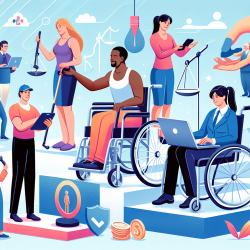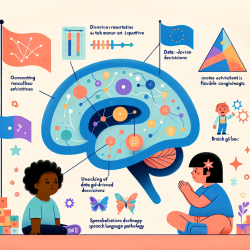In the evolving landscape of employment, the gig economy has emerged as a significant player, particularly for individuals with disabilities. The research article "Gig Workers with Disabilities: Opportunities, Challenges, and Regulatory Response" sheds light on this crucial topic. Here, we’ll delve into the findings and discuss how practitioners can leverage these insights to improve outcomes for children and encourage further research.
Understanding the Gig Economy
The gig economy refers to a labor market characterized by short-term contracts or freelance work as opposed to permanent jobs. This model offers flexibility and autonomy, which can be particularly beneficial for individuals with disabilities. According to the research, the gig economy provides a viable alternative to traditional employment, which often comes with significant barriers for people with disabilities.
Opportunities for Gig Workers with Disabilities
The research highlights several opportunities that gig work presents for individuals with disabilities:
- Flexibility: Gig work allows individuals to set their own schedules and work at their own pace, accommodating their unique needs and health conditions.
- Independence: Many people with disabilities prefer self-employment due to the control it offers over their work environment and tasks.
- Accessibility: Gig work often involves remote tasks that can be done from home, reducing the need for physical workplace accommodations.
Challenges to Address
Despite these opportunities, the research also identifies significant challenges:
- Lack of Benefits: Gig workers typically do not receive traditional employment benefits such as health insurance, retirement plans, or paid leave.
- Income Stability: The income from gig work can be unpredictable, which can be particularly challenging for individuals who rely on a steady income to manage their health conditions.
- Regulatory Gaps: Current labor laws often do not extend to gig workers, leaving them vulnerable to exploitation and discrimination.
Strategies for Practitioners
Practitioners can play a pivotal role in supporting gig workers with disabilities by:
- Advocacy: Advocate for policy changes that extend employment protections and benefits to gig workers.
- Support Services: Provide resources and support services to help individuals navigate the gig economy, including financial planning and access to health care.
- Research: Encourage further research to better understand the needs and experiences of gig workers with disabilities, and to develop targeted interventions.
Encouraging Further Research
While the current research provides valuable insights, there is a need for more data to fully understand the long-term impacts of gig work on individuals with disabilities. Practitioners should collaborate with researchers to collect data and develop evidence-based strategies that promote inclusive and equitable employment opportunities.To read the original research paper, please follow this link:
Gig Workers with Disabilities: Opportunities, Challenges, and Regulatory Response.










